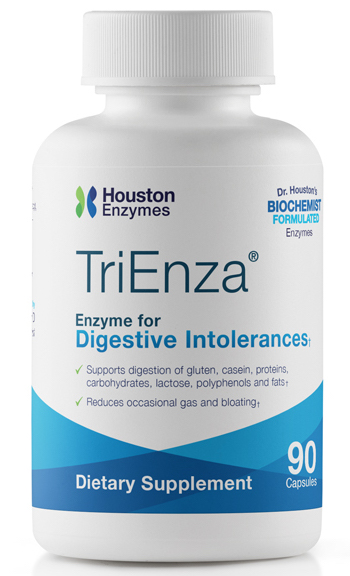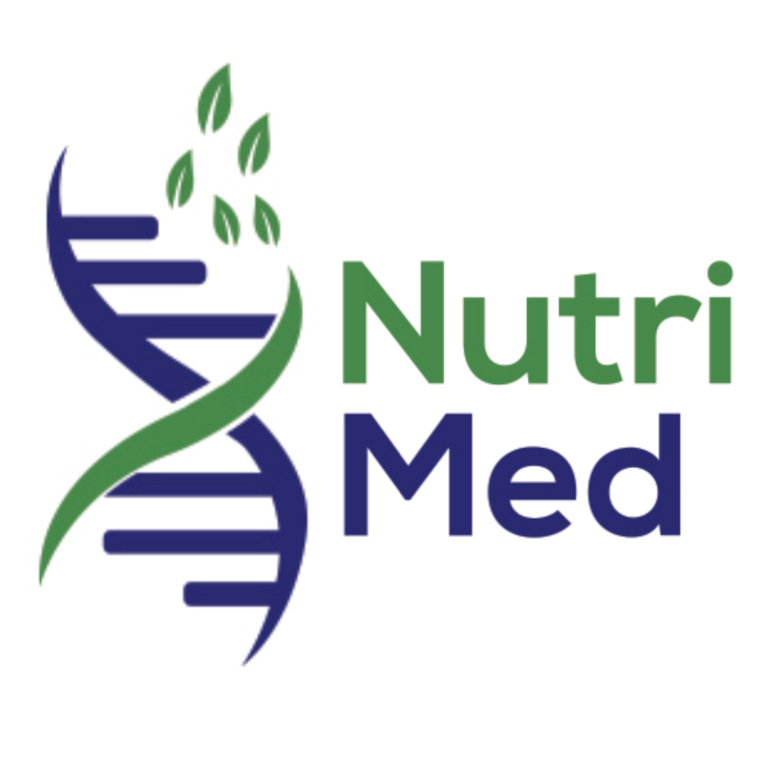Trienza
Enzyme for Digestive Intolerance
- Supports digestion for gluten, casine, proteins, carbohydrates, lactose, polyphenols and fats.
- Reduce occasional gas and bloating.
Benefits of TriEnza
- Enzyme product for multiple food intolerances
- Supports digestion of gluten, dairy, proteins, carbohydrates, polyphenols and fats
- Includes the DPP IV (“DPP 4”) enzyme to support the digestion of gluteomorphin (from gluten) and casomorphin (from dairy casein)
- Reduces occasional gas and bloating

The enzymes in TriEnza offer support for:
- Food proteins
- Gluten
- Casein in dairy
- Carbohydrates
- Sugars
- Lactose
- Polyphenolic vegetables and fruits
- Fats in foods and supplements
- Fiber
Who should use TriEnza?
If you need support for digestion of multiple types of foods, try TriEnza.
TriEnza Dosage
Two (2) capsules per meal or as needed. Less may be adequate for smaller meals. Most find using 2 to 4 capsules per meal adequate, and most likely no further benefits will occur with higher dosing, though more may be given for the infrequent and large food challenges. Each person is different so we encourage some experimentation to find the dose that best helps each person.
What's new & improved with TriEnza?
The changes we made to TriEnza should result in a product better able to:
- Break down gluten, dairy casein, soy, and meat protein.
- Support digestion of the sugars sucrose and maltose, which will also be helpful for the gut microbiome.
- Help with occasional gas and bloating through fiber breakdown.
- Better support for protein digestion, including gluten and casein.
We exchanged a Protease.
We exchanged one of the proteases, an enzyme for proteins, for a particular newer protease which is more efficient for the breakdown of gluten, dairy casein, soy and other food proteins. This enzyme is listed as “Protease” on the TriEnza label.We reduced the DPP IV.
In order to add the new Protease, we reduced the amount of another enzyme for proteins, referred to as “Peptidase with DPP IV”. With the addition of the new Protease, the need for the DPP IV Peptidase enzyme is less. - Improved enzyme breakdown for sugars.
We added Invertase.
We’ve added the enzyme Invertase to better break down table sugar, known as sucrose.We added Diastase.
To help with another common sugar, maltose, TriEnza now has the enzyme Diastase on the label. Diastase works to break down the maltose that results from eating starches. - More support for gas and bloating from fiber.
We increased the Cellulase.
Most gas and bloating from meals is actually due to the fiber present. To help with this issue, we added Cellulase. Celluase can work on fiber along with the other two fiber enzymes already present in TriEnza (Xylanase and Beta-glucanase).Fiber breakdown contributes to a healthy environment for gut bacteria. TriEnza can help reduce the amount of gas and bloating by making fiber more soluble (dissolvable in water) and digestible.
A few changes were made to the Other Ingredients for our updated TriEnza formulas:
- TriEnza capsules now have Medium Chain Triglyceride Powder added, derived from palm/coconut kernel oil.
- TriEnza Chewables now have the sweetener Xylitol added.
- TriEnza Powder now has Microcrystalline Cellulose added. The Medium Chain Triglyceride Powder in TriEnza Powder is derived from palm/coconut kernel oil.
TriEnza is still our best broad-spectrum enzyme product for protein, gluten, dairy, starches, carbohydrates, fats, fiber, and polyphenolic foods.
Contraindications for Enzyme Supplementation
These enzymes should be used with care in cases of active stomach or duodenal ulcers, severe bowel inflammation (characterized by blood in stools), hemophilia and other bleeding disorders, or within a week of scheduled surgery. This product may not be appropriate for those with known allergies to Aspergillus enzyme proteins, though non-specific mold allergies do not necessarily preclude use of fungal enzymes. Consult your medical doctor for further advice, and err on the side of caution. Those with known anaphylactic allergic reactions to fungal proteins should NOT ingest fungal-derived enzymes.
